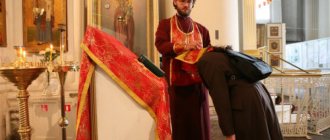Content
There are several versions about the origin of the call to prayer (adhan or nida). According to one, the tradition of the call to prayer arose even before Muhammad’s migration to Medina (Hijra). According to another, after the migration, approximately in the second year of the Hijra. It is obvious that the Prophet Muhammad introduced the ritual of “adhan” by analogy with the ringing of bells among Christians and the sound of a trumpet among Jews. The first muezzin, the Abyssinian Bilyal ibn Rabah, first called people to prayer on the streets, and only after some time they began to use the highest point in the city for this. There were also regional methods of calling: in Fez (Morocco) a banner was strengthened on the minaret, and in the dark a lamp was lit. In Indonesia, in a number of mosques, the beginning of prayer is announced by the sound of a gong (influence of Buddhism).
Historians believe that even before Islam, Arab tribes had a custom of making a special cry, for example, to gather members of the tribe for a military council. This was entrusted to a person called a munadi or muazzin. The verb "adzana" in Arabic means "to shout in public."
What is the correct name for Muslims when they sing?
Music in Islam: Islam's attitude to music
Music is one of those controversial issues that concerns many Muslims. Indeed, the position of music in Islam is quite controversial: some say that any music other than ad-daff (small drum) at weddings is considered haram, while others are less categorical - in their opinion, Islam’s attitude towards music is generally positive and all that music that does not contain vicious motives or connotations may be considered permitted.
In principle, absolutely everyone agrees that music that includes pagan, vulgar and inciting lyrics is unacceptable. However, some believe that the prohibition of music in Islam does not fit into the proclaimed harmonious approach of Islam to life and have even drawn up a set of rules, observing which music in Islam becomes supposedly permitted: in their opinion, it is enough that the music corresponds to the teachings of the religion, is performed in an appropriate manner and I didn’t allow myself to be distracted from real life. In support of this view, adherents of this view cite the fact that all four imams considered music and songs to be permissible, and cite as examples quotations from the “Legal Rulings” of Al-Qadi Abu Bakr and other scholars.
However, this is already slander and a huge misconception! Firstly, the imams did not believe that music was permissible in Islam: “This is a lie erected on the four imams, for they were unanimous in the prohibition of musical instruments!” (Mihaju-Ssunna, 3/439). And secondly, not only among the first imams, but also among the scholars of the first three generations in general, there was no disagreement about the features of cult music in Islam. Thus, Hafiz Ibn Kathir reported: “The Imams conveyed the unanimous opinion of scholars about the prohibition of musical instruments” (Masala al-sama’, 472), and Imam Ibn al-Jawzi said: “The first generations of Shafi’i scholars considered songs to be forbidden, and as for their permissions, then their later followers began to say this due to lack of knowledge and following their passions! (Talbisu Iblis, 245)
Those who follow their passions should not forget that the Koran directly says: music in Islam is haram. An example is the words of the Almighty: “Among the people there is one who bribes idle speech in order to lead others astray from the path of Allah without any knowledge, and mocks it. For such are destined for humiliating torment” (Luqman 31:6). You can also add another verse: “And when they hear idle talk, they turn away from it and say: “We will get our deeds, and you will get yours. Peace to you! We do not wish to follow the path of the ignorant" (Quran, 28:55).
Islamic scholars have said that “idle speech” refers to music.
We should also not forget about the following words of the Prophet (peace and blessings of Allaah be upon him): “In my community there will be people who drink wine, but call it by another word, and with it they will play musical instruments. Allah will punish them, and the earth will swallow them up and turn some of them into monkeys and pigs.” Another hadith said even more simply and convincingly: “Truly, singing creates hypocrisy in the heart.”
Naming order in Islam
Every Muslim is ordered by the Almighty to fulfill the most important mission - to leave behind righteous offspring. True believers strive to cultivate good morals in their children from the first minutes of their lives. A kind of “starting point” in this is the naming ceremony (or “isem kushu” among the Tatars and a number of other Turkic peoples).
So, several months of waiting and preparation for the arrival of a new family member are over - the long-awaited baby returns home with his mother. The parents have already chosen a name for the boy (or girl). All that remains is to carry out the naming procedure in accordance with Islamic canons. However, many Muslim couples wonder when and how this ritual is performed correctly.
Term
In the Islamic tradition, it is customary to carry out naming on the seventh day after the birth of a child, because this is in accordance with the Most Pure Sunnah of the Final Messenger of Allah (s.w.w.). However, there are reliable hadiths indicating that the Prophet Muhammad (s.a.w.) did this procedure on the very first day. Based on both options, some theologians have concluded that it is advisable to give a name during the first week of the baby’s life. Moreover, in modern realities it is impossible to do this on a birthday due to objective factors - the baby lies with the mother in the maternity hospital for several days.
Herself'
Sama' Mevlevi in Konya. Ottoman miniature. XVII century © Bridgeman Images / Fotodom
Sama' is not only the concept of music in the broad sense, but also the special zeal of the Sufis, including singing, playing musical instruments, and sometimes dancing - raqs.
Not all Sufi brotherhoods use sama in their practice: the most widely popular are the zeal of the Turkish Mevlevi order, also known as the Order of the Whirling Dervishes. The introduction to the practice of music and dance is associated with the teachings of the great mystic and poet of the 13th century, Jalal ad-Din Rumi, who called sama "the food of the soul." The goal is to focus on the thought of God with the help of the sounds of music and endless whirling. In this performance, constructed according to strict rules, string or percussion instruments, voice, but above all the flute - nay, can be used, a kind of sound symbol of the Sufi worldview: “Listen to this flute, how it cries... / Anyone who remains far from his root , / again looking for the time of connection..." (Jalal ad-Din Rumi, "Mesnevi"). Sama' of the Turkish Mevlevi Order
What is the correct name for Muslims when they sing?
In Turkey, the muezzin sings from the mosque 5 times a day.
Each time - different suras, in an original “arrangement”. Performers change. You can hear it when a young, bold experimenter or, conversely, an experienced and cautious traditionalist. True, I have not seen a single Turk performing namaz. But I saw and felt for myself how different a country is in which prayers are broadcast over a loudspeaker to the entire city, and not announcements about the need to inform on “suspicious persons” and calls to march in formation. In this tourist paradise on land and water, people and citizens are respected. Let citizens of other countries be tourists. But the national idea of the Turks is not the fear of terrorist attacks and not denunciations against one’s neighbor or those far away, but a warm sea, a hearty table and just the thrill of life. At the Beldibi market, strawberries and cherries cost 2 dollars per 1 kg (liras, dollars, euros, rubles are accepted). In Moscow, the same fruit, only bruised, is sold FIVE (5) times more expensive! It’s good on the Mediterranean coast, in Antalya and Kemer, Beldibi - in general, where we are no longer there! At Antalya airport, apart from the announcer asking some Japanese tourist to pick up his lost passport, I did not hear a single official announcement about the terrorist threat or the need to remain vigilant. Although, in Turkey, “cleansing” operations are also underway in Kurdistan, with Syria and Palestine nearby. However, immediately after arriving home in Vnukovo, an announcer came into my ears with instructions on where to report suspicious fellow citizens. I immediately wanted to fly back. The first trip is to the main peak of Turkey. The Winter Olympics were recently held here. It was not easy to climb Takhtali 2365m - in the funicular, when wooded cliffs float a hundred meters under your feet, you somehow feel uneasy
but at the top, above the clouds, it’s not so scary
oxygen starvation forces you to speak English
in the Antalya Botanical Garden, Nikita immediately met a white swan, href='static.diary.ru/userdir/2/3/5/6/235633/75002387. '>
fed her cookies
The hotel room is cleaned every day. Tip the maid a couple of times (1-2 dollars) - and she laid out a swan for her son from a towel with cypress legs.
love, sea, childhood
This is Türkiye!
Qawwali
Amir Khosrow Dehlavi. Fragment of a miniature. Deccan, circa 1725 National Museum, New Delhi
Qawwali is another Sufi musical tradition that is finding more and more fans in the modern world. Its homeland is India, and its founder is the outstanding poet and musician Amir Khosrow Dehlavi (1253–1325), who belonged to the Chishtiyya Sufi order. The poems of Amir Khusrow still serve as one of the textual foundations of qawwali music. Performances by qawwali performers were traditionally held at the graves of Sufi saints, but today they can be heard at concerts. One of the characteristics of this music, religious in its content, is ecstatic rhythms, accentuated by percussion instruments or handclaps. The melodic basis is usually provided by one or two instruments - harmoniums, and in the center there is a lead singer with two or three complementary players who create melodic counterpoints. Counterpoint (from Latin dot against dot) - here: the combination of two or more melodies in different voices.
Over the years, one of the premier qawwali performers has been Nusrat Fateh Ali Khan (1948–1997), whose art has captivated listeners in both the East and West.
A fragment of the concert of Nusrat Fateh Ali Khan and his ensemble in Yokohama. 1992
Dhikr
Miniature from the manuscript “Divan” by Hafiz Shirazi. Herat, circa 1480 The Metropolitan Museum of Art
Dhikr (Arabic for “remembrance”) is a ritual of remembrance of God based on the repetition of individual words, such as “Allah,” or phrases: among the most frequently heard is the first half of the Shahada “La Ilaha” Illallah" ("There is no God but Allah").
Although zikr is also present in ordinary worship, today it is better known as an element of Sufi rituals. In the practice of different Sufi orders, dhikr may differ in form. First of all, it is divided into “quiet” (pronounced mentally) and “loud”. “Loud” dhikrs can take many forms: performed in unison by voices, accompanied by instruments (most often percussion) or without them; a solo chant of Sufi poetry, uttered while sitting or in motion, which in some cases turns into an endless dance. The most important thing here is the rhythm of constant repetition of words and formula phrases. A common effect of such dhikrs is to plunge participants into a state of ecstatic excitement.
Turkish dhikr
Women's dhikr in Dagestan
Duties of a muezzin
From the very beginning, the muezzin was seen as an assistant to the imam. The Righteous Caliph Umar ibn Khattab (634-644) sent a man to help the governor of Kufa as a “muezzin and vizier.” At the same time, a ritual was developed when the muezzin first called the faithful on the street, and then went to the ruler, greeted him and invited him to prayer. Returning to the mosque, the muezzin announced the beginning of prayer. The text of the adhan at that time was very short. Subsequently it was used only in emergency situations. After the architectural type of the mosque was developed and the minaret appeared, the adhan began to be performed directly from the balcony of the minaret. This happened under the Umayyad caliph Abd al-Malik (685-705). The Arab traveler Ibn Battuta (1304-1377) said that in Khorezm it was the duty of the muezzin to expel the faithful from their homes for prayer.
Over the years, requirements for a professional muezzin developed: he had to have a powerful but pleasant voice that all residents of the area had to hear. The melodious pronunciation of the words of the adhan was taught to those children who showed the ability to sing. Sometimes the functions of the muezzin were inherited. Families with blind boys saw the career of a muezzin as an opportunity for their children to obtain a source of food, since the muezzin was considered an employee of the mosque with a certain salary. In addition, when climbing the minaret, the blind muezzin did not see what was happening in the courtyards and houses of the residents and, in particular, women.
In some large mosques, a tradition of choral recitation of the adhan arose. In addition to the azan, muezzins began to perform special praises, for example, they pronounced the “beautiful names of Allah.” Sometimes the duties of a muezzin were assigned to an astronomer, who had to certify the correctness of the qibla (direction to prayer) during the construction of a mosque, as well as calculate the time of prayer.










